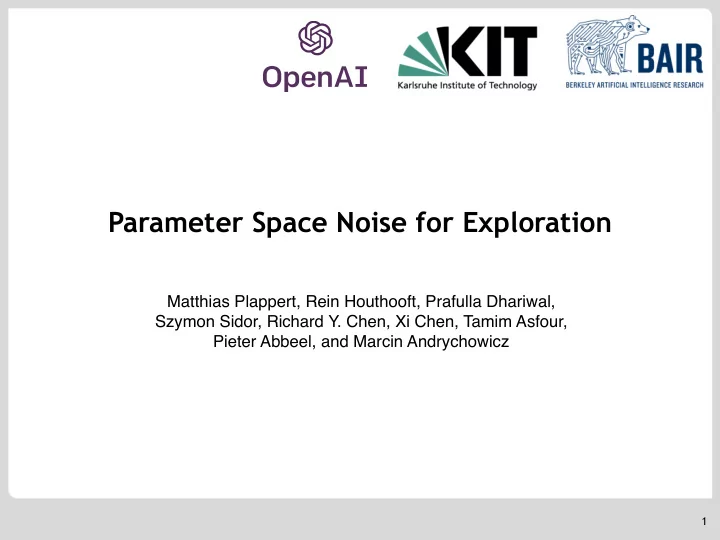

Parameter Space Noise for Exploration Matthias Plappert, Rein Houthooft, Prafulla Dhariwal, Szymon Sidor, Richard Y. Chen, Xi Chen, Tamim Asfour, Pieter Abbeel, and Marcin Andrychowicz 1
“Let the Noise Flo” - Flo Rida 2
Background – Reinforcement Learning 3
Parameter Space Noise – Motivation 4
Parameter Space Noise – Formulation We sample the noise at the beginning of each rollout, and keep it fixed for the duration of the rollout. 5
Parameter Space Noise – Formulation 6
Parameter Space Noise – Problems 7
Parameter Space Noise – Problems 8
Parameter Space Noise – Problems 9
Parameter Space Noise – Problem 1 Adding noise to now perturbs activations which are normalized to zero mean and unit variance more sensitivity to mean noise Each layer would have similar sensitivity to 10
Parameter Space Noise – Problem 2 11
Parameter Space Noise – Experiments (1) We test for exploration on a simple but scalable toy environment [1] Chains of length N with initial state . Each episode lasts N + 9 steps, algorithm successful if it can get the optimal reward of 10. Experiments on DQN with different exploration methods [1] “Deep exploration via Bootstrapped DQN”, Osband et al., 2016 12
Parameter Space Noise – Experiments (2) 13
Parameter Space Noise – Experiments (3) 14
Parameter Space Noise – Experiments (4) Evaluation on 7 MuJoCo continuous control problems DDPG with different exploration methods Exploration of additive Gaussian noise (left) vs. parameter space noise (right) 15
Parameter Space Noise – Experiments (5) 16
Parameter Space Noise – Conclusion Conceptually simple concept designed as a drop-in replacement for action space noise (or as an addition) Often leads to better performance due to better exploration Especially helps when exploration is especially important (i.e. sparse rewards) Seems to escape local optima (e.g. HalfCheetah) Works for off- and on-policy algorithms for discrete and continuous action spaces 17
Parameter Space Noise – Related Work Concurrently to our work, DeepMind has proposed “Noisy Networks for Exploration”, Fortunato et al., 2017 “Deep Exploration via Bootstrapped DQN”, Osband et al., 2016 “Evolution strategies as a scalable alternative to reinforcement learning”, Salimans et al., 2017 “State-dependent exploration for policy gradient methods”, Rückstieß et al., 2008 And a lot of other papers on the general topic of exploration in RL 18
Thank you! 19
Recommend
More recommend